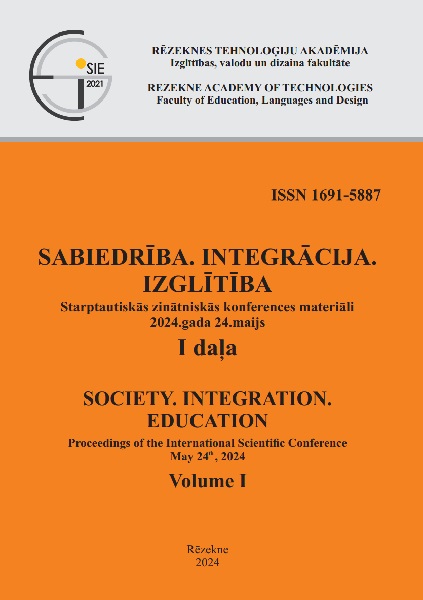SCHOOL LEADERS MATTER: THE ROLE OF SCHOOL PRINCIPALS IN IMPLEMENTING UDL IN K-12 SCHOOLS
DOI:
https://doi.org/10.17770/sie2024vol1.7862Keywords:
K-12 School, Leadership, Principal, Universal Design for LearningAbstract
The aim of this article is to fill the gap of scientific evidence on the role of school principals in implementing UDL in K-12 schools. The case study research was conducted, and field notes were taken from one district in Lithuania, which has been implementing UDL in its schools since 2019. The data for this research was gathered using in-depth semi-structured interviews involving 5 participants. Based on an inductive thematic analysis, six themes emerged: initiating UDL as an organisational change; planning and ensuring the development of staff competencies related to didactic decisions; initiating changes in teachers’ attitudes; motivating teachers to take leadership at the classroom level; promoting the sharing of experiences among teachers (successes and failures); and establishing and maintaining an organisational culture. The discussion explores the implications of the findings for the successful and effective application of UDL in K-12 schools.
References
Baesu, C., Bejinaru, R. (2013). Leadership approaches regarding the organizational change. The USV Annals of Economics and Public Administration. 13(2/18), 146-152.
Bergman, J., Rentsch, J., Small, E., Davenport, S., Bergman, S. (2012). The Shared Leadership Process in Decision-Making Teams. The Journal of Social Psychology, 152(1), 17-42.
Braun, V., Clarke, V. (2006). Using thematic analysis in psychology. Qualitative Research in Psychology, 3, 77–101.
Carson, J., Tesluk, P., Marrone, J. (2007). Shared Leadership in Teams: An Investigation of Antecedent Conditions and Performance. The Academy of Management Journal, 50(5),1217- 1234.
Center for Applied Special Technology (CAST). (n.d.). Until learning has no limits®. Retrieved from: http://www.cast.org/
Clayton, J., Goodwin, M. (2015). Culturally Competent Leadership through Empowering Relationships: A Case Study of Two Assistant Principals. NCPEA Education Leadership Review, 16(2), 131-144.
Corrigan, J., Merry, M.F. (2022). Principal Leadership in a Time of Change. Frontiers in Education, 7, 1-14.
Creswell, J. W., & Clark, V. L. (2010). Designing and conducting mixed methods research. Thousand Oaks, CA: Sage Publications
Drescher, M. A., Korsgaard, M. A., Welpe, I. M., Picot, A. & Wigand, R. T. (2014). The dynamics of shared leadership: Building trust and enhancing performance. Journal of Applied Psychology, 99(5), 771–783.
Fessehatsion, P.W. (2017). School Principal’s Role in Facilitating Change in Teaching-Learning Process: Teachers’ Attitude. A Case Study on Five Junior Schools in Asmara, Eritrea. Journal of Education and Practice, 8(6), 134-142.
Fovet, F. (2020). Integrating Universal Design for Learning in Schools: Implications for Teacher Training, Leadership and Professional Development. Innovations in Educational Leadership and Continuous Teachers’ Professional Development, 295–318.
Fullan, M. (2007). The new meaning of educational change (4th ed.). Teachers college press, Colombia university. New York and London.
Govindasamy, V., Mestry, R. (2022). The principal’s role in managing curriculum change: Implications for the provision of quality education. South African Journal of Education, 42(4), 1-10.
Grillo, M. (2021). The Administrator’s Role in Universal Design for Learning’s Successful Implementation. TEACHING Exceptional Children, 54(5), 372-379.
Harris, A. (2013). Distributed leadership: Friend or foe? Educational Management Administration & Leadership, 41(5), 545-554.
Hattie, J.A.C. (2012). Visible Learning for Teachers. Maximizing impact on Learning. London: Routledge.
Kin, T.M., Kareem, O.A., Nordin, M.S., Bing, K.W. (2018). Principal change leadership competencies and teacher attitudes toward change: the mediating effects of teacher change beliefs. International Journal of Leadership in Education. Theory and practice, 21(4), 427-446.
Korstjens, I., Moser, A. (2018) Series: Practical guidance to qualitative research. Part 4: Trustworthiness and publishing. European Journal of General Practice, 24(1), 120–124.
Kotter, J.P. (2012). Leading change. Boston, MA: Harvard Business Review Press.
Kressler, B. & Kressler, J. (2020). Diverse student perceptions of active learning in a large enrollment STEM course. Journal of the Scholarship of Teaching & Learning, 20(1), 40–64.
Leithwood, K., Mascall, B., Strauss, T., Sacks, R. (2007). Distributing Leadership to Make Schools Smarter: Taking the Ego Out of the System. Leadership and Policy in Schools: The Leading Edge of Distributed Leadership Research, 6(1), 37-67.
MacFarlane, K., Woolfson, L. M. (2013). Teacher attitudes and behavior toward the inclusion of children with social, emotional and behavioral difficulties in mainstream schools: An application of the theory of planned behavior. Teaching and Teacher Education, 29(1), 46–52.
Marzano, R.J., Waters, T., McNulty, B.A. (2005). School Leadership That Works: From Research to Results. USA: ASCD.
Meyer, A., Rose, D., Gordon, D. (2014). Universal design for learning: Theory and practice. Cast Professional Publishing.
Nedzinskaitė-Mačiūnienė, R., Stasiūnaitienė, E., Šimienė G. (2022). Through thick and thin: lower secondary school students’ barriers to learning under Covid-19 conditions. Center for Educational Policy Studies Journal, 12(3), 167-189.
Novak, K. (2019). UDL: An Introduction from Pizza Parlor to the World. In What Really Works with Universal Design for Learning. Edit. W.W. Murawski, K. L. Scott. Thousand Oaks, California: Corwin.
Novak, K. & Rodriguez, K. (2016). Universally Designed Leadership: Applying UDL to Systems and Schools. USA: CAST Professional Publishing.
Novak, K. & Woodlock, M. (2021). UDL Playbook for School and District Leaders. USA: CAST Professional Publishing.
Pan, S.C. & Franklin, T. (2011). In-Service Teachers’ Self-Efficacy. Professional Development, and Web 2.0 Tools for Integration. New Horizons in Education, 59(3), 28-40.
Rogers-Shaw, C., Kroth, M., Carr-Chellman, D., & Choi, J. (2022). Profound Learning Through Universal Design. eLearn, 11.
Walk, M. (2023). Leaders as change executors: The impact of leader attitudes to change and change-specific support on followers. European Management Journal, 41(1), 154-163.
Wang, D., Waldman, D. A. & Zhang, Z. (2014). A Meta-Analysis of Shared Leadership and Team Effectiveness. Journal of Applied Psychology, 99, 181-198.






